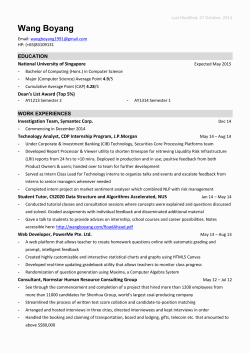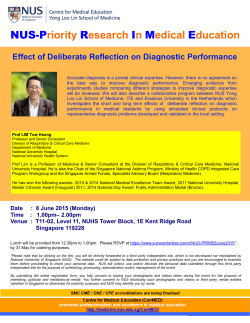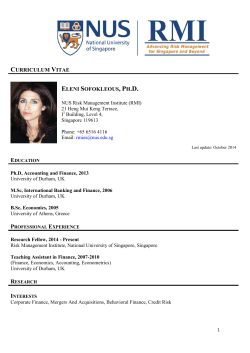
Government Policies and the NUS Experience
Internationalising Higher Education in Singapore: Government Policies and the NUS Experience Dr.Teofilo C. Daquila Dept of Southeast Asian Studies, FASS & NUS Teaching Academy National University of Singapore 1. Background Experience as international student, scholar, educator and administrator Clustering of faculty members including the migration cluster Incentives to carry out research Research study involving 3 countries and 6 universities 2. Globalisation vs internationalisation Globalisation – defined as the economic, political and societal forces pushing the 21st century higher education toward greater international involvement (Altbach & Knight 2007) => Global capital has heavily invested in knowledge industries worldwide, including higher education and advanced training => Reflects the emergence of knowledge society, rise of the service sector, dependence on knowledge products and highly educated personnel for economic growth - Meaning of internationalisation - “Internationalisation at the national/ sector / institutional level is the process of integrating an international, intercultural or global dimension into the purpose, functions or delivery of higher education at the institutional and national levels” - Knight (2008) 3. Research question How have governments and universities responded to internationalisation of higher education? - internationalisation @ home - internationalisation abroad 4. Significance important policy issue for governments in both developed and developing countries important research and policy issue for universities new ways of governance 5. The Global Picture Rapid increase in international students Newsweek (2006): - over past 3 decades, number of students leaving home each year expanded by about 4%, from 800,000 in 1975 to 2.5 million in 2004. (ii) OECD data: number of foreign students in OECD campuses rose by 35% btwn 1998 and 2002 (i) (iii) The Observatory on Borderless Higher Education report on “International Student Mobility: Status Report 2009” - - - Tertiary enrolment reportedly grew from 92 to an estimated 132 million between 1999 and 2004, an increase of more than 43%. Over the same five year period, the number of internationally mobile students increased from 1.75 million to 2.5 million, highlighting a comparable rise of 42.9%. Dramatic growth in student mobility is occurring across the world; as many as 3 million students are now pursuing tertiary education overseas”. (iv) Observatory on Borderless Higher Education, 2009 - Major players (US, UK, Australia) – 44% of total market - Middle powers (Germany, France, China) – 25% - Shape shifters (Japan, New Zealand, Canada) – 10% - Emerging contenders (Singapore, Malaysia, South Korea) – 6% (v) International Students in Australia, Enrolment by Sector Sector 2002 2004 2006 2008 Share, % (2008) Growth 2008/2007 Higher Educ’n 115,897 151,503 172,297 182,770 33.6 4.7 VET 54,181 59,065 83,685 175,461 32.3 46.4 ELICOS 57,961 61,873 77,468 125,727 23.1 23.4 Schools 23,295 27,341 24,717 28,798 5.3 7.1 Other 23,543 25,574 25,651 31,142 5.7 13.6 Grand Total 274,877 323,356 383,818 543,898 100 20.7 https://internationaleducation.gov.au/research/International-StudentData/Documents/Monthly%20summaries%20of%20international%20student %20enrolment%20data%202013/12_December_2013_MonthlySummary.pdf (vi) International Students in Japan (i) (ii) (iii) (iv) (v) Trend: Significant increase in int’l students from 15000 in 1985 to 64,011 in 2000 to 132,720 in 2009 Origin: 92% comes from Asia, mostly from China (60%), Korea (15%) and Taiwan (4%) Institutional type: 2004 – graduate students half of undergrad; 2009, the proportion more than doubled Fields of study: 1/3 in social sciences, ¼ in humanities, 15% engineering Top universities with foreign students: UTokyo, Waseda U, Ritsumeikan APU http://www.jasso.go.jp/statistics/intl_student/documents/data13_e.pdf 6. Case Study: Singapore - international student enrolment rose from 70,000 in 2005 to 80,000 in 2007, and to expand further to 150,000 in 2015 (EDB target) Rationale & Govt Policies Historical legacy that results in a multiracial society Outward-oriented policy in response to global forces Education system is constantly changing as it becomes more creative, innovative and internationally tradeable Policy of bilingualism 1) Internationalising the curriculum, promoting values and graduate attributes 2) Coordinated policies in education, migration, manpower requirements, and population 3) Promoting Singapore as education hubs The NUS Experience Globalising the University in terms of Education, Research and Services NUS Vision - To become a leading global university centred in Asia Mission - To transform the way people think and do things through Education, Research and Service Strategy Nurture, recruit and retain best quality people. Attract the best students Provide a high quality educational experience Focus on high impact research Inject a spirit of enterprise into education and research Nurture committed alumni to be key members of the NUS community Develop global profile and reach as a leader among universities. Adopt and adapt best practice governance and management Source: NUS Annual Report 2014 Responding to Globalisation of Education Internationalisation at home - reflected in the number of international students at NUS and the various initiatives, strategies and innovative programs of study as well as teaching and learning environment Internationalisation abroad - NUS has designed international programs including SEP, NUS Overseas Colleges, internship programs, joint/double programs, summer programs, fieldtrips, enrichment, and others. NUS Global Experience “NUS is a leading global university, with a ranking of 27th among the world’s 100 universities, with: - over 36,000 students from 100 countries, - 51 bachelor’s degree programmes, - 70 double degree programmes, - 31 joint degree programmes, - 15 concurrent degree programmes, - 29 double major programmes, - 180 overseas partner universities for student exchange programs, - 7 NUS Overseas Colleges at major entrepreneurial hubs - 156 masters and doctoral degree, and graduate diploma programs - 50% of NUS students go overseas and 25% spend at least one semester abroad. Student Feedback on Internationalisation Abroad Genevieve-Laine Chang: Competitive edge Business School and USP, Year 4 These [overseas experiences] strengthened my confidence, maturity, communication skills and knowledge, all of which helped me secure the very competitive investment banking summer internship at a top UK bank. I am now being considered for a permanent position there. At NUS, there is such a vast array of opportunities that give us an edge over students from other institutions. James Choo – International career NUS-NYU Class of ’09 Upon reflection, the overseas programme offered me more than a lifestyle away from Singapore. It gave me a rare opportunity to achieve a headstart in my law career, where I handle cross-border transactions for multinational clients in a large international law firm...The NUS-NYU programme offered a first class global education and equipped me with invaluable experiences which I have brought back to my career in Singapore. Veerapan Swaminathan - Positive difference Faculty of Engineering and USP, Year 4 Taken together, these overseas experiences have taught me that while the world appears unbelievably diverse, we all share similar hopes, dreams and even tell the same stories in multiple languages. I’m now committed to making a positive difference to struggling communities around the world and much credit is due to NUS for enabling me to do just that. Zuraidah Abdul Hamid – Global citizen School of Design and Environment, Year 3 “My 18-day YEP (Youth Expedition Project to the Philippines) and subsequent semester-long student exchange to Korea through NUS’ global opportunities have enriched my life and expanded my horizon. They have strengthened my independent learning and inter-cultural communication skills. I am ready to position myself as a citizen of the world and look forward to my next global experience. Internationalisation at Home: Personal Experiences Second-year Class – SEA Studies Honours class – SEA Studies Graduate Coursework Class - Southeast Asian Studies Graduate Research Students – SEA Studies Integrating international and local students in the classroom: (1) Seminars (2) Group Work Outcome: Creative & critical thinking, interpersonal and communication skills, intercultural engagement, global awareness Using group work - 1 Class divided into smaller groups Week 11 (group discussion & preparation) Each group is given a set of short readings Discussion based on a set of guidelines (highlights, relevant concepts, author’s arguments, own views, relevance/lessons Group presentations in Week 12 Reading the case study materials Brainstorming Using Group Work – 2 General Education Module: Understanding the Changing Global Economy Concluding remarks Coordinated policies between education, immigration, population & manpower policies Competitiveness of Singapore & the NUS Brand Singapore and NUS supportive of a more liberal internationalisation policy both at home and abroad Implications and challenges for the University of the Philippines System
© Copyright 2025









